Thesaurus : Doctrine
Thesaurus : Doctrine

► Full Reference: Segonds, M., Compliance, Proportionality and Sanction. The example of the sanctions taken by the French Anticorruption Agency, in Frison-Roche, M.-A. (ed.),Compliance Monumental Goals, series "Compliance & Regulation", Journal of Regulation & Compliance (JoRC) and Bruylant, to be published.
___
► Article Summary: Before devoting the developments of his article to the sole perspective of sanctions imposed under "Anti-corruption Compliance", the author recalls in a more general way that, as is the sanction, Compliance is in essence proportional: Proportionality is inherent to Compliance as it conditions any sanction, including a sanction imposed under Compliance.
This link between Proportionality and Compliance has been underlined by the French Anti-Corruption Agency (Agence française anticorruption - AFA) with regard to risk mapping, which must measure risks to arrive at effective and proportional measures. This same spirit of proportionality animates the recommendations of the AFA which are intended to apply according to the size of the company and its concrete organisation. It governs sanctions even more, in that punitive sanctions refer on one hand to Criminal Law, centered on the requirement of proportionality. Punitive sanctions It governs sanctions even more, in that punitive sanctions refer on the other hand to the disciplinary power of the manager who, from other sources of law, must integrate the legal requirement of proportionality when he/she applies external and internal compliance norms.
____
_______
Thesaurus : Doctrine
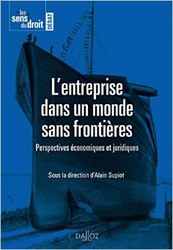
► Référence complète : S. Manacorda, "La dynamique des programmes de conformité des entreprises : déclin ou transfiguration du droit pénal des affaires ?", in A. Supiot (dir.), L'entreprise dans un monde sans frontières. Perspectives économiques et juridiques, coll. "Les sens du droit", Dalloz, 2015, p. 191-208.
____
► Résumé de l'article :
____
🦉Cet article est accessible en texte intégral pour les personnes inscrites aux enseignements de la Professeure Marie-Anne Frison-Roche
________
Thesaurus : Doctrine
Thesaurus : Doctrine
► Référence complète : Association des professionnels du contentieux économique et financier (APCEF), La réparation du préjudice économique et financier par les juridictions pénales, 2019.
____
________
Thesaurus : Doctrine
Thesaurus : Doctrine
Référence complète : Boursier, M.-E., L’irrésistible ascension du whistleblowing en droit financier s’étend aux abus de marché, Bulletin Joly Bourse, 1ier septembre 2016.
Les étudiants de Sciences po peuvent lire l'article en accédant au dossier "MAFR - Régulation"
Thesaurus : Doctrine

► Référence complète : S-M.. Cabon, "Théorie et pratique de la négociation dans la justice pénale", in M.-A. Frison-Roche & M. Boissavy (dir.), Compliance et Droits de la défense - Enquête interne, CIIP, CRPC, Journal of Regulation & Compliance (JoRC) et Dalloz, coll. "Régulations & Compliance", à paraître.
____
📕consulter une présentation générale de l'ouvrage, Compliance et Droits de la défense - Enquête interne, CIIP, CRPC, dans lequel cet article est publié
____
► Résumé de l'article (fait par le Journal of Regulation & Compliance - JoRC) : L'auteure définit la technique de "négociation" comme celle par laquelle "chaque interlocuteur va tenter de rendre compatibles par un jeu de coopération et de concessions mutuelles", ce qui va donc être utilisé dans la justice pénale française non pas tant par attraction du modèle américain, mais pour tenter de résoudre les difficultés engendrées par le flux des contentieux, le procédé s'étant élargi aux contentieux répressif, notamment devant les autorités administratives de régulation. Le principe en est donc la coopération du délinquant.
L'auteur souligne les satisfactions "pratiques" revendiqués, puisque les cas sont résolus, les sanctions sont acceptées, et les inquiétudes "théoriques", puisque des principes fondamentaux semblent écartés, comme les droits de la défense, l'affirmation étant faite comme quoi les avantages pratiques et le fait que rien n'oblige les entreprises à accepter les CJIP et les CRPC justifient que l'on ne s'arrête pas à ces considérations "théoriques".
L'article est donc construit sur la confrontation de "l'Utile" et du "Juste", parce que c'est ainsi que le système est présenté, l'utilité et le consentement étant notamment mis en valeur dans les lignes directrices des autorités publiques.
Face à cela, l'auteur examine la façon dont les textes continuent, ou pas, de protéger la personne qui risque d'être in fine sanctionnée, notamment dans les enquêtes et investigations, le fait qu'elle consente à renoncer à cette protection, notamment qu'elle apporte elle-même les éléments probatoires de ce qui sera la base de sa déclaration de culpabilité tandis que l'Autorité publique ne renonce pas encore au même moment à la poursuite étant problématique au regard du "Juste".
La seconde partie de l'article est donc consacrée à "l'Utile contraint à être Juste". A ce titre, l'auteur pense que l'indépendance du ministère public devrait être plus forte, à l'image de ce qu'est le Parquet européen, et le contrôle du juge judiciaire plus profond car la procédure actuelle de validation des CJIP semble régie par le principe dispositif, principe qui ne sied pas à la justice pénale.
________
Thesaurus : Doctrine
Référence : Beauvais, P., Méthode transactionnelle et justice pénale, in Gaudemet, A. (dir.), La compliance : un nouveau monde? Aspects d'une mutation du droit, coll. "Colloques", éd. Panthéon-Assas, Panthéon-Assas, 2016, pp. 79-90.
Voir la présentation générale de l'ouvrage dans lequel l'article a été publié.
Publications : Doctrine
Thesaurus : Doctrine
►Référence complète : Galli, M., Une justice pénale propre aux personnes morales : Réflexions sur la convention judiciaire d'intérêt public , Revue de Sciences Criminelle, 2018, pp. 359-385.
____
Thesaurus : Textes
►Référence complète : Picod, F., « La lutte contre la fraude, exigence impérieuse d’intérêt général » in Berlin, D. et al. (dir.), La fraude et le droit de l'Union européenne, 1e édition, Bruxelles, Bruylant, 2017, p. 55-70.
May 7, 2025
Thesaurus : Doctrine
► Référence complète : J.-L. Halpérin et A.D. Kessler, Les échanges en matière de droit pénal entre les Etats-Unis et l'Europe / Transatlantic Engagement with Criminal Law, Clio Thémis, Open Edition, mai. 2025, en numérique et accès libre.
____
____
► sommaire :
-
Jean-Louis Halpérin et Amalia D. KesslerIntroduction [Texte intégral]
-
Jean-Louis Halpérin
-
Sylvia Kesper-Biermann
-
Amalia D. Kessler
-
Luigi Lacchè
-
Aniceto Masferrer
________

April 5, 2025
Publications

🌐follow Marie-Anne Frison-Roche sur LinkedIn
🌐subscribe to the Newsletter MAFR Regulation, Compliance, Law
🌐subscribe to the Video Newsletter MAFR Surplomb
____
 ► Full Reference: M.-A. Frison-Roche, Arbitration, a highly appropriate technique for deploying Compliance Law, in particular to satisfy the Vigilance Obligation, Working Paper, March 2025.
► Full Reference: M.-A. Frison-Roche, Arbitration, a highly appropriate technique for deploying Compliance Law, in particular to satisfy the Vigilance Obligation, Working Paper, March 2025.
____
🎤 This Working Paper was developed as a basis for the Overhang👁 video on ... April 2025 : click HERE
____
🎬🎬🎬In the collection of the Overhangs👁 It falls into the Notion category.
►Watch the complete collection of the Overhangs👁 : click HERE
____
► Summary of this Working Paper: If Arbitration has so far not developed much in Compliance Law, it is because this new branch of Law is not well known. Indeed, if it were simply a matter of 'conformity' with mandatory regulations, then Arbitration involving rights that are freely available to the parties and Compliance would be 2 worlds that must ignore each other.
But Compliance Law is defined quite differently. Its normativity lies in the Monumental Goals set by the political authorities, which oblige large companies, because these compagnies are in a position to do so, to contribute to achieving these Goals, namely the future preservation of the Systems (banking, digital, climate, energy, etc.) and human beings involved. While the Goal is constrained, the company is free to choose the means, as long as these means are credible. Arbitration is one of them. From the arbitration clause to the appropriate award.
One example is the Duty of Vigilance, the cutting edge of Compliance. In order to effectively find solutions in the value chain that the company governs, Arbitration is a suitable means of achieving the Monumental Goals of environmental protection and human rights, under the control of the Judge.
____
🔓read the developments below⤵️
Updated: March 25, 2025 (Initial publication: Feb. 13, 2025)
Hearings by a Committee or Public organisation
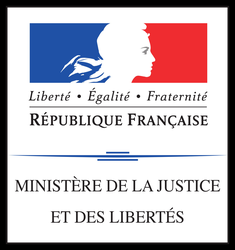
🌐follow Marie-Anne Frison-Roche on LinkedIn
🌐subscribe to the Newsletter MAFR Regulation, Compliance, Law
🌐 subscribe to the Video Newsletter MAFR Overhang/Surplomb
____
► Full Reference: M.-A. Frison-Roche, hearing before the French working group on the modernisation of French Arbitration Law, about the issue Arbitrage et Droit de la Compliance : est-il besoin d'un texte ? ("Arbitration and Compliance Law: is a text required?"), Directorate of Civil Affairs' French Ministry of Justice, 13 February 2025.
____
► Result of this presentation and the ensuing discussion, recorded in the working group's report published in March 2025 (published in French, translated her: "This report on the guiding principles would not be complete without mentioning the discussions in the working group on the introduction of a guiding principle requiring the arbitral tribunal to take into account "human, environmental and compliance issues, as well as respect for the fundamental rights and freedoms of the parties".This proposal gave rise to particularly heated discussions. Some saw it as a scarecrow likely to make French Arbitration Law less attractive and to weaken Arbitration awards, opening up cases of recourse on the pretext of bad faith, even though these values would already be taken into account in the review of domestic or international public policy. Others, on the other hand, felt that such a text would have the advantage of enshrining an Arbitration Law connected to values that are not exclusively economically oriented, pointing out, moreover, that such a principle would not be redundant with the control of public policy, which intervenes ex post, whereas this text imposes Ex Ante responsability, and that this principle would allow a noteworthy introduction of Compliance Law in rbitration. They added that the promotion of such values could make it possible to demonstrate a commitment to virtuous arbitration practice. In the light of these differences, after much hesitation, the decision was made not to include it in the draft Code, considering that the final choice was more a question of political dimension that the working group felt it could not decide on its own. ". (p. 36).
____
► English Summary of the presentation: My presentation deals with the relationship between Compliance Law and Arbitration, particularly International Arbitration. It is built around 12 successive points. The work I have carried out on these various points is associated with it. It precedes the answers I shall give to the questions put by the members of the working group and the ensuing discussion.
1. stagnation in the relationship between Arbitration and Compliance Law, due to continuing misunderstandings about Compliance
2. progress towards a better understanding of Compliance and the appropriateness of the arbitrator's role within Compliance Law
3. prospects for the growing relationship between Compliance Law and Arbitration, particularly with regard to the value chains built up by international companies
4. educational issues
5. time required to build a "culture of place" in this matter
6. "Doctrinal" difficulties
7. benefit from the production of a "doctrine of place" on this subject
8. going beyond the continental summa divisio of Public Law and Private Law
9. practical assimilation of Regulatory Contracts in sustainable sectors and chains
10. opening up the Arbitration World to this articulation with Compliance Law
11. Can an official legal text contribute to this?
12. example of the guiding principles of the French Code of Civil Procedure.
____
🔓read the presentation developments below⤵️
March 23, 2025
Law by Illustrations

🌐suivre Marie-Anne Frison-Roche sur LinkedIn
🌐s'abonner à la Newsletter MAFR Regulation, Compliance, Law
🌐s'abonner à la Newsletter en vidéo MAFR Surplomb
► Référence complète : M.-A. Frison-Roche, "Pour juger un acte, il faut plonger dans les récits contradictoires des uns et des autres. En cela tout procès est "atypique"🎬documentaire Le procès", billet mars 2025.
____
___
Le procès est un documentaire, diffusé sur TF1 le dimanche 23 mars 2025. Il porte sur un procès pour meurtre qui se déroule devant la Cour d'assises du Gard. Celui-ci est présenté comme "atypique", en ce que la victime y semble presque absente, son objet étant davantage la relation entre l'auteur du meurtre et sa mère (I). Il en ressort que juger des actes, celui du fils mais aussi celui de la mère, suppose la reconstitution crédible des faits, ce qui suppose aussi de comprendre les êtres humains impliqués (II). Tout procès est ainsi construit, mais l'on peut affirmer aussi que tout procès est atypique (III). Ce que la passion des algorithmes doit considérer.
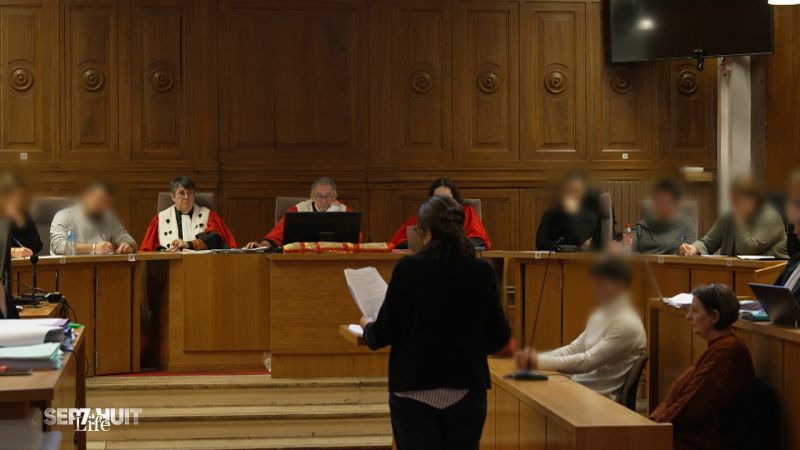
I. UN DOCUMENTAIRE SUR UN PROCES D'ASSISES ATYPIQUE : SON OBJET EST LA RELATION ENTRE L'AUTEUR DU MEURTRE ET SA MÈRE
La chaine présente le documentaire : "vous verrez le procès comme si vous y étiez".
Le procès d'assise qui est déroulé à la Cour d'Assises de Nîmes est présenté dans l'ordre chronologique, la voix off rappelant quelques règles élémentaires, par exemple la désignation des jurés.
Il est aussi présenté comme "atypique", car le sujet n'est pas tant le meurtre lui-même mais les rapports entre l'auteur du meurtre et sa propre mère, qui est la compagne de la victime. En effet, le fils soutient qu'il a battu avec une batte de base-ball celui-ci pour le dissuader de continuer à battre sa mère et que, descendant de la chambre après l'avoir battu, il en informe sa mère. Mais sa mère a une version différente des faits, pour justifier notamment le fait qu'elle ne se soit pas déplacée pour aller voir l'état de la victime, affirmant qu'elle n'a pas vu cette batte.
Les psychiatres confirment ce caractère atypique en raison de la relation entre la mère et le fils, celui-ci ne pouvant assumer le rôle de protecteur qu'on exige de lui. Le psychiatre observe que la perte de contrôle que traduit le geste en est la conséquence.
Quant à elle, la mère dit qu'elle n'avait pas compris ce qui se passait. Elle est elle-même poursuivie pour délit de non-assistance à personne en danger.
Le documentaire considère que le sujet est donc la relation entre la mère et le fils, Cette relation est décrite comme fusionnelle, le fils étant instituée comme chef de famille tandis que la mère est dans un état de dépression permanente. Les témoins décrivent la mère comme étant "toxique", ne concevant pas que son fils puisse exister en dehors d'elle, le fils se sacrifiant. Des témoins considèrent que la mère serait manipulatrice.
II. JUGER UN ACTE SUPPOSE LA RECONSTITUTION CRÉDIBLE DES FAITS ET DE COMPRENDRE LES ETRES HUMAINS IMPLIQUÉS
Ce cas ainsi exposé montre d'une façon extrême que l'on ne peut juger les actes (le meurtre par le fils, la non-assistance à personne en danger par la mère).
La question de preuve, et les qualifications qui en découlent, est la suivante : celle des intentions. En effet, l'intention de tuer est en cause, l'avocate de l'accusé demandant pendant l'audience la requalification en blessures mortelles ayant entrainé la mort sans l'intention de la donner. De la même façon, l'intention de la mère de ne pas agir, voire l'intention d'utiliser son fils.
L'écoute des questions, des réponses, montre la difficulté de reconstituer ce qui est exact, ou à tout le moins crédible, dans les faits évoqués par les personnes, et plus largement les récits articulés par les uns et les autres.
Il ressort des uns et des autres que c'est le récit global de la mère qui est le moins crédible.
III. UN PROCÉS ATYPIQUE, DES EXIGENCES ET MÉTHODES PROBATOIRES COMMUNES
Ce que l'on peut retenir dans ce que ce documentaire porte sur la crédibilité des récits.
En effet, comme le rappelle l'Avocat général : "on n'est jamais dans la tête des gens". C'est pourquoi l'Avocat général récuse avec force la demande de requalification et rappelle la définition juridique de l'intention criminelle.
De la même façon, l'avocate de la mère rappelle que celle-ci n'est pas poursuivie pour avoir été une "mauvaise mère". Elle a sans doute une "responsabilité morale", qu'elle a reconnue, mais elle n'a pas de responsabilité juridique, l'avocate soulignant qu'il ne faut pas confondre Droit et Morale.
Ce qui est remarquable est qu'à ce titre ce procès qui est présenté comme "atypique" est comme tous les autres procès, non seulement les procès pénaux mais les procès civils.
Cet entrechoc des récits est ainsi raconté par Eliette Abécassis à travers son roman Divorce à la française.
______
Dec. 28, 2024
Law by Illustrations

🌐suivre Marie-Anne Frison-Roche sur LinkedIn
🌐s'abonner à la Newsletter MAFR Regulation, Compliance, Law
🌐s'abonner à la Newsletter en vidéo MAFR Surplomb
► Référence complète : M.-A. Frison-Roche., "Un cas pratique probatoire et procédurale difficile :🎬𝑭𝒓𝒂𝒄𝒕𝒖𝒓𝒆", billet décembre 2024.
____
🎞️voir le film-annonce
___
Il y a beaucoup de films sur les procès criminels, c'est même la majorité des situations juridiques qui ont attiré les cinéastes, surtout dans le monde britannique et nord-américain📎
On en voit moins qui ne portent que sur la preuve. Mais sur l'affiche même du film 𝑭𝒓𝒂𝒄𝒕𝒖𝒓𝒆 c'est de preuve dont il s'agit : I shot my wife. Prove it.
Ce film sorti en 2007 est de Grégory Hoblit.
La phrase reproduite sur l'affiche montre d'emblée que la preuve juridique ne relève pas que du sens commun, car s'il est "évident" que le fait a eu lieu, puisque l'auteur dit l'avoir fait, encore faut-il que dans l'espace juridictionnel, cela soit dûment prouvé, c'est-à-dire selon la procédure que le Droit impose : c'est tout le thème du film.
Car par ailleurs l'intrigue est de boulevard : un mari âgé et riche (joué par Anthony Hopkins) aime sa jeune épouse qui aime quant à elle un jeune amant qu'elle voit en cachette et auquel elle cache sa véritable identité. En rentrant d'une de leurs rencontres clandestines, son mari l'attend et lui tire dans la tête. Affaire banale, affaire simple. Le procureur-adjoint (joué par Ryan Gosling) ne prend d'ailleurs en charge la poursuite contre le mari pour obtenir vite fait/bien fait que parce qu'elle ne présente pas de difficulté : le mari a avoué l'avoir tuée, l'arme est retrouvée. Une affaire vite réglée, avant qu'il ne quitte le bureau du Procureur pour aller travailler dans un cabinet d'avocats. Enfin l'argent. Le mari a raconté au poste de police devant le policier qui a fait le constat du drame comment il a tué sa femme. Tout colle. Drame terrible, drame banal. Le procureur-adjoint va pouvoir passer à la suite, au Droit des affaires.

Mais finalement l'épouse qui a reçu une balle dans la tête n'en est pas morte. Cela ne change pas grand chose, elle est comme morte : dans le coma, elle demeure désormais dans un service spécialisé. Mais le comportement du mari est étrange, puisqu'il rejette tout ce que le Droit organise pour la protection des accusés, par exemple l'assistance d'un avocat.
Chacun se dit qu'il ne connaît vraiment rien au Droit. Le spectateur se doute que cela est une feinte et qu'il joue à ne pas le connaître, à des fins incompréhensible puisque l'aveu et l'arme le mènent à une condamnation à la perspective de laquelle il demeure passif. Pour convaincre les jurés de son incompétence technique, il fait exprès de ne pas maîtriser le vocabulaire juridique le plus élémentaire, celui que tout le monde entend dans les séries et au cinéma. Il insiste sur son ignorance de tout cela. Il montre avec insistance son inaptitude à manier le Droit. Il ne soulève pas une objection alors qu'il faut en évoquer une (le juge essaie de l'aider, l'incite à le faire, il ne le fait pas), il en soulève une à contresens. On se dit qu'il ne comprend rien à rien, c'est contrariant un accusé qui ne joue pas son rôle. Le procureur et la juge commencent d'ailleurs à être agacés, puis inquiets de voir un homme si maître de lui, riche et puissant, agir si étrangement, sentent le piège. Mais que faire contre quelqu'un qui joue à ce que l'on pourrait dire comme "à contre-procédure" ?
C'est vrai, il n'a pas fait d'études de Droit, il dirige une entreprise de construction d'avions. Il est très riche. pour se distraire, il a fabriqué un immense mobile en acier où il peut faire couler des billes qui passent de niveau en niveau selon un parcours compliqué qu'il a lui-même conçu et fabriqué. Cela ne sera que plus tard que, pensant avoir tendu un piège parfait et qu'il suffit de poser la dernière bille, il se prévaudra d'une disposition du Code applicable, sans se tromper ni sur sa teneur ni sur sa numérotation. Comme l'une des billes qu'il met dans sa machine qui gouverne les rapports qu'il établit avec ce procureur-adjoint, bille qui passe d'un niveau à un autre :

C'est donc un film sur la connaissance des faits, car tout le monde sait qu'il a tué sa femme, et sur les contraintes du Droit qui interdit que l'on traduise directement cette connaissance immédiate et commune en jugement de condamnation.
C'est parce qu'il sait cela que l'auteur de l'acte criminel va construire son piège, un piège proprement juridique, dont les billes sont le Droit lui-même, dans sa procédure et ses règles de preuve. Car il faut qu'il y ait un procès, un procureur et un juge pour qu'il puisse tirer sur sa jeune épouse infidèle et qui ne l'aimait pas, et qu'il sorte pourtant libre du tribunal.
Cela sera triomphalement avec l'acceptation du procureur qui ne pourra de jure prouver l'acte criminel, et cela sera sur l'ordre du juge.

Car l'auteur de l'acte pénalement reprochable connaît aussi les nullités de procédures et c'est intentionnellement qu'il a fait en sorte que celui qui vienne chez lui juste après son acte terrible soit précisément le jeune amant, qualité que celui-ci n'osera de lui-même par la suite révéler, mais que le criminel révéla juste au moment procéduralement opportun.
Il a encore anticipé l'application d'autres règles de procédure, qui vont les unes après les autres lier procureur et juge.
C'est dommage qu'il n'ait pas fait de Droit, la stratégie processuelle lui coule manifestement dans les veines. Pour le pire, certes.
Mais dans les veines du procureur-adjoint, aussi. Car c'est un duel de Droit et de juristes qui est mis en scène : c'est celui qui sera le plus habile, le plus fin dans le maniement des règles et des qualification qui l'emportera. Lequel ? :
Comment ?
Seuls les mauvais résumés ou articles dévoilent les raisonnements et les règles de droit finalement maniés, et leur aboutissement.
Dans ce cas pratique bien pensé, et celui de ce film l'est particulièrement, le procureur-adjoint retourne en bibliothèque et ouvre page après page des ouvrages savant pour retrouver cette règle que, même en anglais, l'on désigne, comme en Droit romano-germanique, en langue latine, lui permettra de s'extraire de la machine diabolique. De ce cas pratique, il ne sera pas donné ici la solution, cela ne serait pas de jeu📎
Mais l'on voit ici une nouvelle fois que c'est dans la qualifications que tient l'art du juriste : les études faites par le procureur le placent plus haut que l'art de l'ingénieur de fabriquer des machines à faire circuler des billes.
C'est aussi pour cela que la Justice et le raisonnement judiciaire sont intimes.
________
V. à ce propos l'introduction in mafr, ... la famille au cinéma, 2012.
Mais ceux qui apprécient le latin aimeront retrouver les cas, complexes, d'application de non bis in idem, auxquels le diabolique ne pensa pas et qui en tourmente plus d'un.
Dec. 1, 2024
Law by Illustrations

► Référence complète : M.-A. Frison-Roche., "Mise à l'épreuve d'une affirmation "La Justice, c'est la Vérité en Action" : 🎬𝑱𝒖𝒓𝒐𝒓 #𝟐", billet décembre 2024.
🎞️voir le film-annonce
___
Dans la leçon sur le Droit et la Justice que propose Clint Eastwood dans son dernier film, 𝑱𝒖𝒓𝒐𝒓 #𝟐, une des premières scènes nous montre la procureure qui attaque et l'avocat qui défend. Ils se connaissent depuis longtemps et ce n'est pas tant le cas qu'ils évoquent, l'une pour obtenir la condamnation du suspect l'autre pour obtenir la déclaration de son innocence : ils étaient étudiants ensemble. Ils racontent le professeur qui apprit aux deux ce qu'est le Droit et la justice. L'avocat de la défense rappelle que celle qui aujourd'hui est procureure était l'étudiante préférée du Maître. Ce temps est lointain, puisque lui a sans doute moins bien réussi tandis qu'elle construit une carrière brillante et c'est en gagnant des procès qu'elle espère débuter une carrière politique sur le thème de l'ordre, la sécurité et la lutte contre la criminalité.
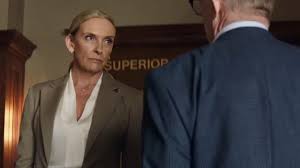
Lors de cette discussion entre deux juristes professionnels de la justice qui, même s'ils sont de chaque côté de la barrière chacun dans son rôle, ils se souviennent du même enseignement qu'ils ont reçu du même professeur dans le même cursus de Droit, construit sur la définition même de ce qu'est la Justice.
Le professeur avait dit :
La justice, c'est la vérité en action
C'est pourquoi l'élève préférée choisit de devenir procureure, c'est-à-dire celui qui agit pour que la Vérité se transforme en Justice : que le coupable soit appelé Coupable, que l'innocent soit appelé Innocent.
Dans cette définition toute aristotélicienne de ce qu'est le rapport entre la Vérité et la procédure judiciaire qu'y joue chacun, et notamment le procureur qui actionne l'action publique, se joue tout le film.
Et son dénouement, par lequel celle qui avait tous les moyens de transformer son office de procureure en carrière politique et qui garda en tête ce que lui enseigna son professeur à la fois ce qu'est l'appareillage juridictionnel et ce pour quoi il est fait et la façon dont chacun doit y tenir son rôle : le procureur, l'accusé, l'avocat et le juré :

Nous pouvons aussi bien regarder cette leçon de Droit et en tirer profit.
____
Nov. 1, 2024
Thesaurus : Doctrine
► Référence complète : A. Latil, “Telegram et le délit d'administration d’une plateforme de transactions illicites“, CCE, novembre 2024, n° 11, alerte 318, pp. 3-4
____
🦉Cet article est accessible en texte intégral pour les personnes inscrites aux enseignements de la Professeure Marie-Anne Frison-Roche
________

Oct. 11, 2024
MAFR TV : MAFR TV - Overhang
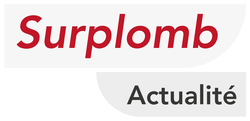
🌐suivre Marie-Anne Frison-Roche sur LinkedIn
🌐s'abonner à la Newsletter MAFR. Regulation, Compliance, Law
🌐s'abonner à la Newsletter Surplomb, par MAFR
____
► Référence complète : M.-A. Frison-Roche, "L'extension du domaine de la CJIP par la voix de la connexité : la CJIP Nestlé Waters du 2 septembre 2024", in série de vidéos Surplomb, 11 octobre 2024
____
🌐visionner sur LinkedIn cette vidéo de la série Surplomb
____
____
🎬visionner ci-dessous cette vidéo de la série Surplomb⤵️
____
Surplomp, par mafr
la série de vidéos dédiée à la Régulation, la Compliance et la Vigilance
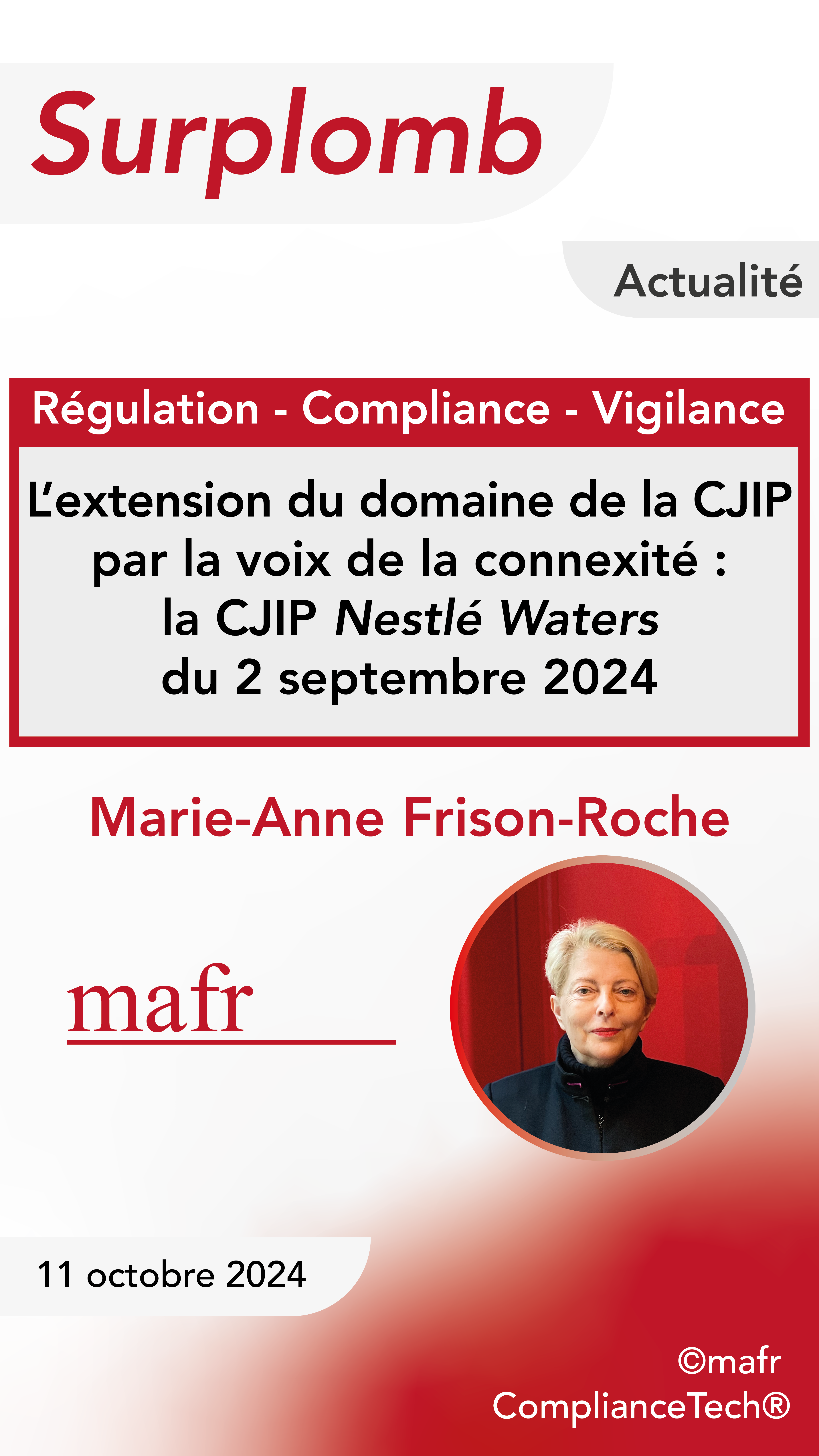

Oct. 1, 2024
Thesaurus : 02. Cour de cassation
► Référence complète : Crim., 1er oct. 2024, n° 23-81.328
____
____
🌐Lire le commentaire fait de cet arrêt
________
Sept. 12, 2024
Editorial responsibilities : Direction of the collection "Cours-Série Droit privé", Editions Dalloz (33)
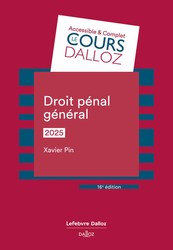
► Référence complète : X. Pin, Droit pénal général 2025, Dalloz, coll. "Cours Dalloz-Série Droit privé", 16ième éd., 2024, 722 p.
____
► Présentation de l'ouvrage : La nouvelle édition pour 2024 de cet ouvrage à jour des dernières réformes, aborde dans un premier temps la "loi pénale", dans sa détermination et dans son application, puis dans un deuxième temps l'ouvrage aborde "l'infraction" avec sa qualification et son imputation pour finir dans une troisième partie sur "la peine", en distinguant entre la peine encourue, la peine prononcée et la peine exécutée.
____
📚Consulter l'ensemble de la collection dans laquelle l'ouvrage a été publié
____
📚Sont directement corrélés à cet ouvrage :
🕴️Ch. André, 📕Droit pénal spécial
🕴️E. Verny, 📕Procédure pénale
🕴️G. Beaussonie, 📕Droit pénal des affaires
________
Aug. 14, 2024
Editorial responsibilities : Direction of the collection "Cours-Série Droit privé", Editions Dalloz (33)
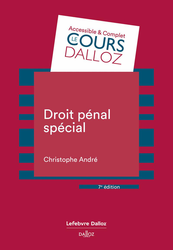
► Référence complète : Ch. André, Droit pénal spécial, Dalloz, coll. "Cours Dalloz - Série Droit privé", 1ière éd., 2010, 7ième éd., 2021, 552 p.
____
► Présentation de l'ouvrage : La 6ième édition de ce Cours est à jour des réformes qui continuellement modifient les infractions pénales, notamment en matière économique et financière mais aussi sociales (par exemple les "gilets jaunes"), montrant avant tout la constante de la crise d'un droit pénal déliquescent et désormais éclaté en droits répressifs spéciaux. Aujourd'hui c'est non seulement un droit pénal spécial mais encore voire avant tout un droit pénal d'exceptions (ce qui pose problème au regard du droit pénal général, lequel est indissociable de la procédure pénal) qu'il faut apprendre, étudiants comme praticiens.
Ce Cours est construit en trois parties.
La première traite des infractions contre les personnes ; la deuxième des infractions contre les biens ; la troisième contres la Nation, l'État et la paix publique.
Les éléments de procédure pénale, indissociables du droit pénal, sont expliqués à chaque infraction explicitée.
____
📕lire la quatrième de couverture
____
📕lire la table des matières
____
📚Consulter l'ensemble de la collection dans laquelle l'ouvrage a été publié
____
📚Sont directement corrélés à cet ouvrage :
________
June 19, 2024
Thesaurus : 02. Cour de cassation
May 29, 2024
Law by Illustrations

► Référence complète : M.-A. Frison-Roche., "La justice au miroir de ses erreurs : Copie conforme", billet mai 2024.
___
En 1947, sort un film Copie conforme qui eut un très grand succès, peut-être parce que Louis Jouvet y endossait tant de rôles.
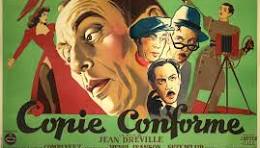
C'est sous cet angle là qu'enfant on me parlait de ce film. Avant d'avoir fait connaissance avec la procédure juridique du "copie conforme", c'est par ce dédoublement du personnage de guignol qui change parce qu'il met une fausse moustache, ou des lunettes, et devient alors un autre, puis trouve un autre homme qui lui ressemble tant que les deux ne deviennent plus qu'un, que je suis d'abord ce qu'était "Copie conforme".
Plus tard, quand j'eus l'âge de lire des livres, puis des livres de droit, j'appris la procédure du "copie conforme" par laquelle un agent doté de l'autorité publique requise peut délivrer un autre document certifié comme reproduisant exactement un original et pouvant faire foi qu'il ne déforme pas celui-ci dans la copie qu'il en fait.
Quel film qui dit tout l'inverse du Droit, qui le fait mentir.
Qui décrit l'injustice de la justice.
____
Il y a beaucoup de perspectives dans ce film, ce qu'est un film, puisque le personnage central est un photographe célèbre, qui peut transformer tout le monde par les photos qu'il prend, la tête ou les jambes dissociés, photographiant l'inspecteur de police lui disant qu'il ne le fait pas payer "puisqu'il se paye sa tête" en lui déformant le visage lui tordant la bouche ce qui rend ses paroles incompréhensibles.
C'est cela l'art de se découper, de transformer, de mettre en carré, Jouvet habillé en prince opérant cela avec quiconque et avec tous.
Mais enfin, parlons ici plutôt du Droit puisqu'il va cesser de se dupliquer en vieillard, en ouvrir, en duc, en déménageur, tout en restant derrière sa caméra, que lorsqu'il sera confronté à la justice en ayant l'idée qui lui sera fatale : celle de trouver un alibi.
Cet alibi, c'est un personne qui n'existe pas puisqu'il s'appelle Monsieur Dupont, qu'il veut mourir (parce que la justice l'a pris pour un autre, pour un duc, pour un déménageur, etc.), et qu'il faut absolument rester dans sa vie qui lui plait et qu'il décrit avec soin : n'être pas "quelqu'un", n'être pas reconnu, avoir ses amis, sa journée réglée, son chat, la belle vie quoi.
Mais le photographe, qui ne peut donc vivre qu'en volant par son appareil et tous ses accessoires toutes les vies possibles de tous les autres possibles (car la femme parfaite photographiée par la tête de l'une et les jambes de l'autre n'existe pas davantage, le duc non plus, etc.), trouve enfin un homme qui croit ne pas vivre mais qui, de banalité en banalité touche plus le sol, en butant sur le pot-au-lait du matin, en rangeant chaque soir sa chemise. Et ça, il va l'appeler : Duplicata. Comme ils se ressemblent, il lui dit que tant qu'il ira cambrioler, l'autre se montrera et ainsi l'image sera donnée de son absence sur les lieux du crime puisqu'il était présent ailleurs.
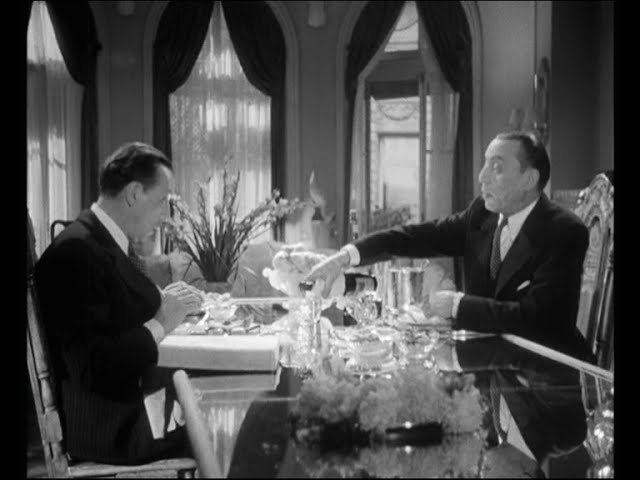
La diabolicum probatio est faite : Louis Jouvet pouvait l'apporter, l'on n'en doutait pas de sa part, le Quai des orfèvres est si proche.
____
Pourquoi le pâle reflet devient-il le personnage consistant ? l'on pourrait dire l'inverse car le splendide n'est qu'une image alors que la scène pivot du film est la discussion, toute entière, des deux dans laquelle le personnage qui croit n'être rien, puisqu'il n'est pas connu et n'a pas de prestance, a une vie et c'est par affection que sa collègue fera un faux témoignage pour lui, mais cela il ne le voit pas. Le voleur, celui qui n'a donc en réalité rien à lui, ne dit rien de lui, que pourrait-il dire puisqu'il est que duc, déménageur, vendeur de diamant, livreur, enfin il suffit de passer commande au photographe et d'attirer sa convoitise, expose juste l'exploitation qu'il va faire de l'insignifiant Dupont.
Dupont quant à lui décrit sa vie, refuse qu'on la lui ôte, revendique que sa vie si insignifiante soit-elle c'est la sienne et qu'elle n'est pas à la disposition d'autrui. J'ai pensé à De minimis. Il raconte que la justice déjà a voulu la lui prendre.
En effet, la justice a voulu la plus prendre. Monsieur Dupont est vendeur de boutons. C'est pour en vendre qu'il entre en contact avec une victime du voleur. Il en vend peu parce qu'il ne sait pas très bien vendre. On a du charisme ou on n'en a pas.
Immédiatement reconnu, il est déféré au tribunal. Le juge le confronte à toutes les victimes.
Formellement les victimes le reconnaissent, formellement les victimes ne le reconnaissent pas. On lui met des lunettes, ou des moustaches, ou des cheveux gris : les victimes commencent à se disputer entre elles.... Mais si c'est absolument ! Mais non ce n'est absolument pas lui !
Et là, sa jeune collègue le sauve de la prison dans laquelle le juge veut l'envoyer en intervenant et en faisant un faux témoignage, affirmant que le jour du délit, ils étaient ensemble, que d'ailleurs ils sont ensemble... Et c'est ainsi qu'il échappe à la prison.

Par la suite, lorsque l'insignifiant, celui qui vit et qui est aimé, rencontre celui qui a de la prestance, c'est-à-dire celui qui est vide et n'a rien, le premier voudra la vie de l'autre. C'est si beau la grande vie, et Louis Jouvet porte si beau la queue-de-pie.
N'est-ce pas un merveilleux film, Copie conforme ?
________
